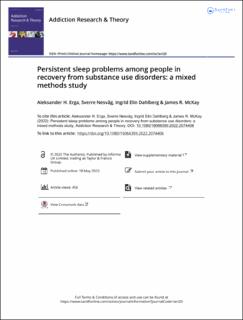| dc.contributor.author | Erga, Aleksander Hagen | |
| dc.contributor.author | Nesvåg, Sverre Martin | |
| dc.contributor.author | Dahlberg, Ingrid Elin | |
| dc.contributor.author | McKay, James R. | |
| dc.date.accessioned | 2022-09-12T09:19:56Z | |
| dc.date.available | 2022-09-12T09:19:56Z | |
| dc.date.created | 2022-08-30T17:15:09Z | |
| dc.date.issued | 2022 | |
| dc.identifier.issn | 1606-6359 | |
| dc.identifier.uri | https://hdl.handle.net/11250/3017170 | |
| dc.description.abstract | Background
The aims of this study are to examine the one-year trajectory of sleep problems, identify clinical correlates, and describe subjective experiences related to persistent sleep problems during recovery from substance use disorders (SUD).
Methods
This study builds on a sequential mixed method design. The quantitative component features data from a prospective longitudinal study of 127 poly-SUD patients in the Stavanger area in Norway, while the qualitative component describes a thematic analysis of interviews with 16 persons from this study still experiencing sleep problems after at least one year of abstinence.
Results
The prevalence of sleep problems at baseline for the whole cohort was 79%. Among the 59 patients who were abstinent after one year, N = 20 (33.9%) had moderate and N = 11 (18.6%) had severe sleep problems. Persistent sleep problems were associated with psychological distress and were experienced as a major challenge in the struggle to stay drug free. Establishing daily routines related to work, school, and care for children were coping strategies for participants with persistent sleep problems.
Conclusions
Persistent sleep problems are often overlooked in a clinical setting. Based on our findings, these issues pose a major challenge in the struggle to stay drug free. For patients with psychological distress, and lack of responsibilities that established daily routines, sleep difficulties may result in increased risk of drug use episodes that result in relapse. These results argue that screening and evidence-based methods for insomnia and sleep health-programs should be commonplace adjunct intervention for patients with SUDs. | en_US |
| dc.language.iso | eng | en_US |
| dc.publisher | Taylor & Francis | en_US |
| dc.rights | Attribution-NonCommercial-NoDerivatives 4.0 Internasjonal | * |
| dc.rights.uri | http://creativecommons.org/licenses/by-nc-nd/4.0/deed.no | * |
| dc.title | Persistent sleep problems among people in recovery from substance use disorders: a mixed methods study | en_US |
| dc.type | Journal article | en_US |
| dc.type | Peer reviewed | en_US |
| dc.description.version | publishedVersion | en_US |
| dc.rights.holder | Copyright 2022 The Author(s) | en_US |
| cristin.ispublished | true | |
| cristin.fulltext | original | |
| cristin.qualitycode | 1 | |
| dc.identifier.doi | 10.1080/16066359.2022.2074406 | |
| dc.identifier.cristin | 2047334 | |
| dc.source.journal | Addiction Research and Theory | en_US |
| dc.identifier.citation | Addiction Research and Theory. 2022. | en_US |

